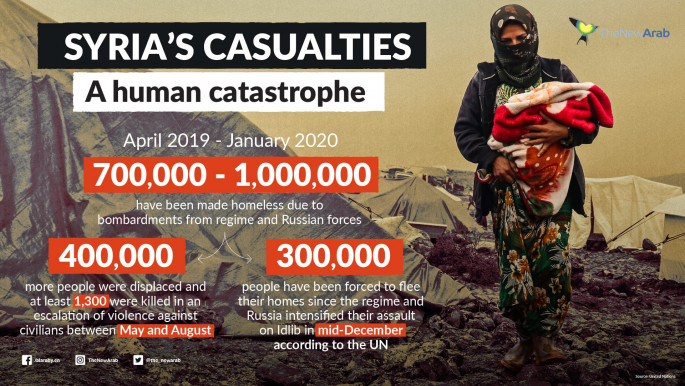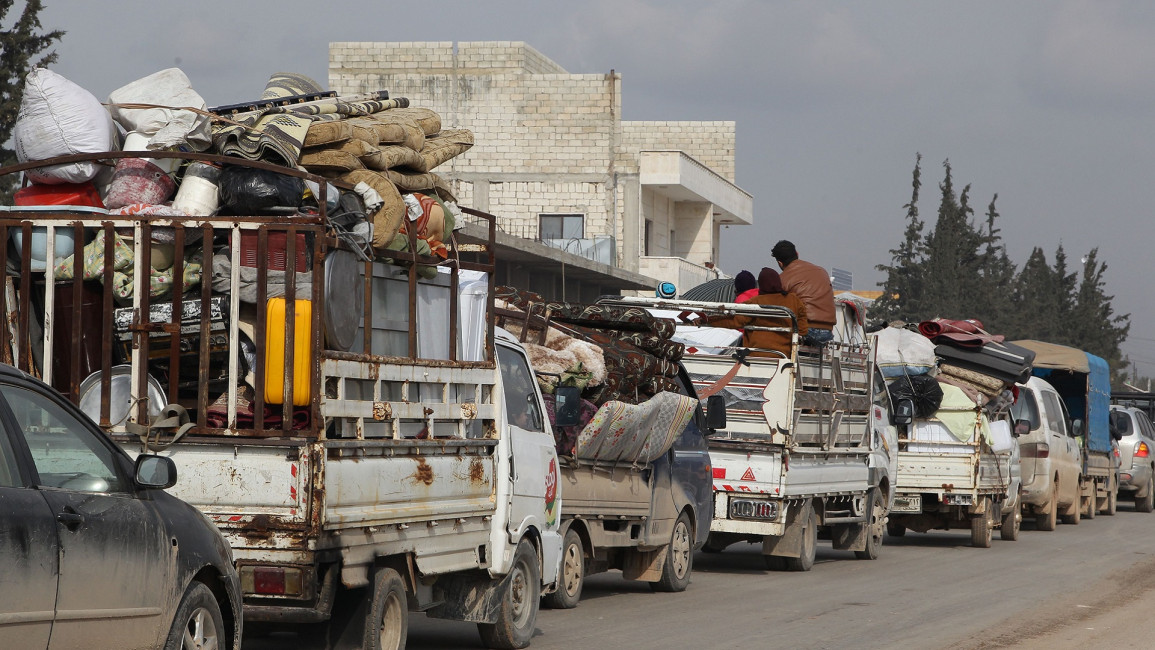Thousands flee as Syrian regime cuts off Maarat Al-Numan
Syrian regime forces were poised on Monday to enter the deserted city of Maarat al-Numan in rebel-held southern Idlib province.
The city once hosted a population of 110,000 but nearly all of its inhabitants fled last month as a result of intense and indiscriminate regime and Russian airstrikes.
It has symbolic and strategic importance as the second largest town in Idlib province and lies on the M5 highway which links Damascus to Aleppo. The regime aims to gain control of the M5, which is Syria’s main economic artery.
When the Syrian uprising against Bashar al-Assad's rule began in 2011, Maarat Al-Numan was a focal point of protests and opposition activity.
Read also: Hard economic times test the patience of Assad loyalists
Idlib province is home to 3.5 million people, some of them displaced by the regime from other formerly rebel-held areas over Syria.
Roughly 358,000 people have been displaced from southern Idlib province in recent weeks as a result of the regime advance, according to the United Nations.
Another 38,000 people fled fighting in western Aleppo province between 15 and 19 January.
Rebels from the National Liberation Front rebel group said on Monday that they had stalled a regime advance in this area, killing and injuring dozens of regime troops and pro-regime Iranian militia fighters.
A few thousand people are still reportedly present in Maarat Al-Numan.
Regime forces have since Friday seized around 14 towns and villages around the city, reaching its eastern outskirts.
Twitter Post
|
They have also cut a section of the M5 highway leading north from Maarat Al-Numan to Idlib city, according to the Syrian Observatory for Human Rights (SOHR) and the pro-regime Al-Watan newspaper.
Hundreds of vehicles on Monday full of people trying to flee the area were packing a road leading out of the area amid heavy regime bombardment.
The head of the SOHR, Rami Abdul Rahman told AFP that regime forces were now stationed south, east and north of Maarat Al-Numan and were pushing from the west and northwest in an attempt to lay siege to the city.
Idlib province, along with nearby areas of Hama, Aleppo and Latakia provinces, is the last remaining area of Syria held by anti-Assad rebels.
Earlier this month Russia and the regime declared a ceasefire in the area only to break it a few days later.
Fearing further regime advances, residents of several towns and villages located north of Maarat al-Numan, have started to flee, according an AFP correspondent.
Pick-up trucks carrying entire families from the town of Saraqib and the Jabal al-Zawiya region packed a road leading north towards the border with Turkey.
The vehicles were crammed with mattresses, clothes and household appliances, many of them belonging to families who had previously fled Maaret al-Numan.
Towards the unknown
Sitting in the front seat of a pick-up truck, Umm Hussein used a tissue paper to dab tears off her face, her watery blue eyes glistening from behind the car window.
"I have left behind my relatives and even my daughter ... who is on the verge of giving birth" said the mother of seven from the Jabal al-Zawiya region, her voice breaking as she spoke.
"I don't know what's going to happen to them, I don't know what's going to happen to my daughter," she added, saying there weren't enough vehicles to get them out.
Despite the heavy movement of civilians, regime ally Russia on Monday pounded areas around the key exit route, killing two civilians. A further three people were killed in regime airstrikes on Saraqeb on Sunday evening, according to The New Arab’s correspondent.
Plumes of white smoke were visible to motorists trapped in the congestion on the highway, an AFP correspondent said.
"We are heading towards the unknown," said one elderly woman, three little children sitting beside her in a pick-up truck.
Aid agencies and relief groups have warned that further violence could fuel what may potentially become the largest wave of displacement seen during Syria's nine-year-old conflict.
Agencies contributed to this report
Follow us on Twitter and Instagram to stay connected



